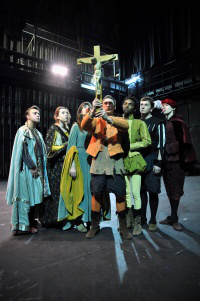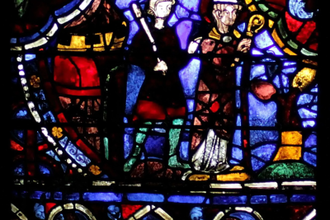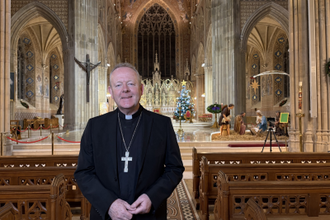Calling all Angels: Catholic play invited to Polish theatre festival in July

Scene from Everyman
A university production of the morality play Everyman has been invited, at short notice, to play at an international theatre festival in Poznan, Poland, this July.
Now all it needs is angels to help it reach its destination
Everyman explores the profound question of dying well and is full of humour, pathos and high drama. Faith, sacraments and seeking after virtue lie at its heart and Everyman is characterised by arresting, emblematic characters, Christian ritual and symbolism.
The play’s director, Dr Philip Crispin of Hull University, said: "Due to time constraints and two thirds of our cast committed to fund-raising for a prolonged season in Edinburgh this summer, we are looking for angels – generous benefactors – to help us reach our goal of attending the festival."
The festival of early plays runs parallel to the triennal International Medieval Theatre Society Conference at the end of July and will bring together theatre troupes from across the world.
Dr Crispin said: "We would be delighted to play for Church groups in Poland and will soon be able to offer a DVD of the production."
Dr Crispin’s production was first staged in Holy Trinity Church, Hull, in 2012, and was then invited to the Medieval English Theatre conference, held at Bangor University in March this year. Dr Sue Niebrzydowski, the conference organiser, said: "The audience comprised leading scholars in the field of medieval drama, and members of the general public. All were very moved by a production that demonstrated the validity and importance of modern playing of medieval drama." Professor John McGavin of the University of Southampton said: "This was a memorable event and a magnificent performance.’ And Professor Andrew Hiscock, Director of the College of Arts and Humanities Graduate School at Bangor, added: ‘It was universally agreed that this was the most persuasively dramatic and most poignant interpretation of the text that anyone of us had ever witnessed."
The play – which addresses the brevity of life and the need to live one’s life rightly – enjoyed great success throughout the twentieth century. The earliest printed edition dates back to around 1520 and this was an adaptation of a Dutch original. Intriguingly, it may not have been staged at all prior to its ‘rediscovery’ in 1901 and hugely popular dramatic revival throughout the twentieth century.
Dr Crispin said: "The play shows how Everyman (ie every individual) is apprehended by Death, God’s “mighty messenger” to explain himself in a “general reckoning”. The eponymous Everyman learns the hard way that bling and selfish living don’t make a perfect end."
Everyman is joined in the play by other allegorical figures such as Fellowship, Goods, Good Deeds, Knowledge, Beauty and Strength. Some of these are much more reliable than others.
Dr Crispin added: ‘We’re engaging fully with the ritual and sacramental richness of the play.’
The play embraces an orthodox Catholic view of the need for good works. Everyman’s account book is ‘blotted and blind’ by a careless, selfish life and Good Deeds is left paralysed on the ground. It is down to Good Deeds’ sister Knowledge to provide Everyman with the sufficient spiritual discernment to rectify matters at the eleventh hour. In the most famous lines of the play, she says: ‘Everyman, I will go with thee and be thy guide/In thy most need to go by thy side.’
An enlightened Everyman rediscovers a deep Christian faith. He repents his sins and embraces a sacramental path to salvation: confession and penance, followed by the Viaticum (the Blessed Sacrament) and the last rites.
Following Everyman’s contrite change of heart, Good Deeds regains bodily control and she and Knowledge prepare to accompany Everyman on his final journey to the grave, with Good Deeds clutching a freshly validated account book.
So why, in a predominantly secular western Europe, does Everyman remain such a perennial favourite? Dr Crispin suggested: ‘Partly by the very fact that it is not secular. It embraces a mystery of faith in a highly ritualised and poetic manner, full of strong visual imagery, reminiscent of the iconography that would have covered the churches in pre-Reformation England.’ He continued: ‘It also addresses a universal subject – human mortality and the need to face up to responsibilities with judgement and generosity – with an element of humour but above all with great poise and pathos.’
Everyman is a beautifully dramatised rite of passage: the passing, indeed, from life into death, when ‘the soul is taken the body fro’. After an initial alienation, Everyman’s arrest by Death, the play goes into the liminal phase of experimentation – Everyman’s many trials and journeying – before his triumphant reincorporation, in the eyes of the faithful, in the communion of the saints.
Following Everyman’s death, an angel says: "Here above thou shalt go/Because of thy singular virtue"
Dr Crispin said: "For us to go to Poland, we need some angels."
*Any potential angels should contact Dr Philip Crispin on p.crispin@hull.ac.uk
Note - after the performance in Poland a reviewer wrote: https://adabrowka.wordpress.com/2013/07/22/teatr-sredniowiecza-w-poznaniu/comment-page-1/#comment-695


















